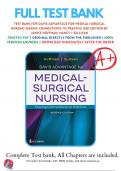Exam (elaborations)
TEST BANK FOR Davis Advantage for Medical-Surgical Nursing Making Connections to Practice 2nd Edition by Janice J. Hoffman, 9780803677074, Chapter 1-71 All Chapters with Answers and Rationals
- Course
- Institution
- Book
Title: Test Bank For Davis Advantage for Medical-Surgical Nursing Making Connections to Practice with Davis Advantage and Davis Edge 2nd Edition By Janice Hoffman, Nancy J Sullivan ISBN: 9780803677074 Number of Pages: 1213 Edition: 2nd Authors: Hoffman, Sullivan Number of Chapters: 71 Enric...
[Show more]



